Spreading Positive Impact Worldwide on the Strength of the "Holistic Approach" Developed through "Reverence for Life"
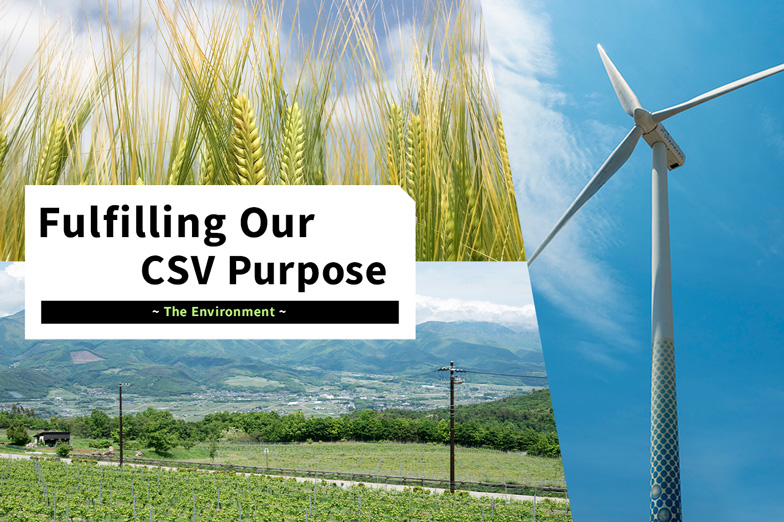
The Kirin Group, which aims to become a global leader in CSV*1, creating value across our business fields of Food & Beverages to Pharmaceuticals, is committed to solving global environmental issues. Being the first food & beverage company in the world to receive Net Zero certification under the SBT Initiative*2 as the GHG reduction target and being named the first in the world by the TNFD*3 to disclose natural capital information by applying the LEAP*4 framework are both testaments to our high global reputation. In addition, our CEO, Mr. Yoshinori Isozaki, is scheduled to appear in a video message produced by SBT Network for the 27th Conference of the Parties (COP27) to the United Nations Framework Convention on Climate Change scheduled in November 2022 and the 15th Conference of the Parties (COP15) to the Convention on Biological Diversity scheduled in December 2022, as one of the top executives of six leading global companies including Nestlé, Unilever and Danone.
*1:Creating Shared Value is the practice of creating economic value by solving social issues.
*2:Science Based Targets Initiative, an international initiative jointly established in 2015 by four organizations: CDP, UN Global Compact, World Resources Institute (WRI), and World Wide Fund for Nature (WWF).
*3:Taskforce on Nature-related Financial Disclosure
*4:A process that focuses on lcation and assesses dependence on and impacts on natural capital. LEAP stands for "Locate", "Evaluate", "Access", and "Prepare"
What is behind the Kirin Group's environmental management that has gained such global recognition? Looking back on the Group's environmental efforts, we would like to share with you the philosophy and unique approach that has fostered this achievement.
Kirin's "Holistic Approach" to Environmental Management
In 2019, the Kirin Group formulated a long-term management plan "Kirin Group Vision 2027 (KV2027)", and declared our goal to become a global leader in CSV by 2027. Based on the premise of our "responsible alcohol producer," we have set forth our CSV Purpose of working to solve issues in "health & well-being," "community engagement," and "the environment" in order to create value together with society.
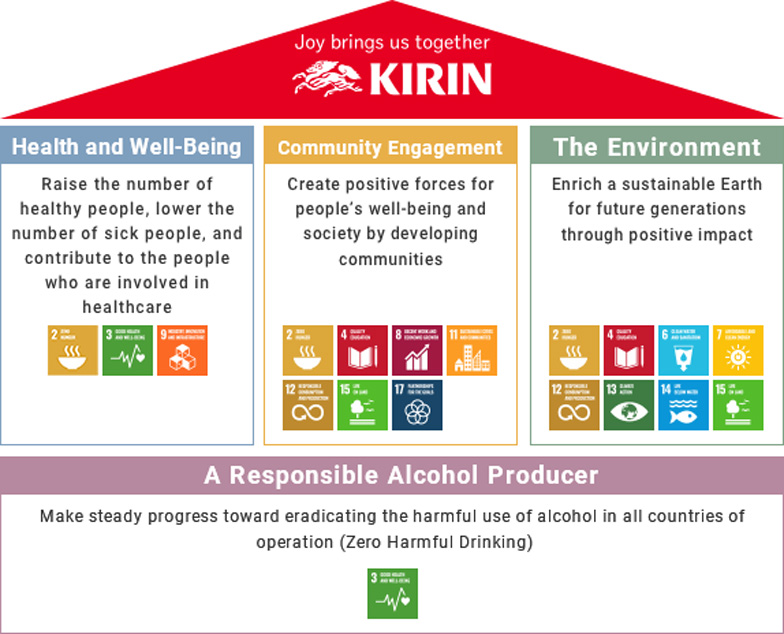
It has been almost three years since we declared our aim to become a global leader in CSV. In the environment, which is one of our CSV purpose, we are beginning to be well-recognized around the world.
In terms of climate change countermeasures, "Kirin Group's Environmental Vision 2050," revised in February 2020, established and disclosed the long-term goal of reducing GHG emissions throughout the value chain to net zero. While many companies in Japan and abroad have set "2050 net zero" targets, our company became the first food & beverage company in the world to be certified as meeting the net zero criteria set by the SBT Initiative in August of this year.
As biodiversity loss has become a concern these days, there has been greater emphasis on risk management by companies involved in natural capital. In March 2022, the TNFD published a framework (beta version v0.1) that requires companies to disclose information from the perspective of natural capital and biodiversity. On July 6, approximately four months later, our company published a disclosure in its environmental report that conforms to this framework. This was introduced on TNFD's LinkedIn page as a world first.
Kirin's efforts are gaining global recognition through its reputation as a "world's first," and are supported by our "holistic approach". We have identified four key global environmental issues: water resources, climate change, containers and packaging, and biological resources. Our emphasis on the holistic approach is based on the idea that these four issues are not independent of each other, but are interrelated.
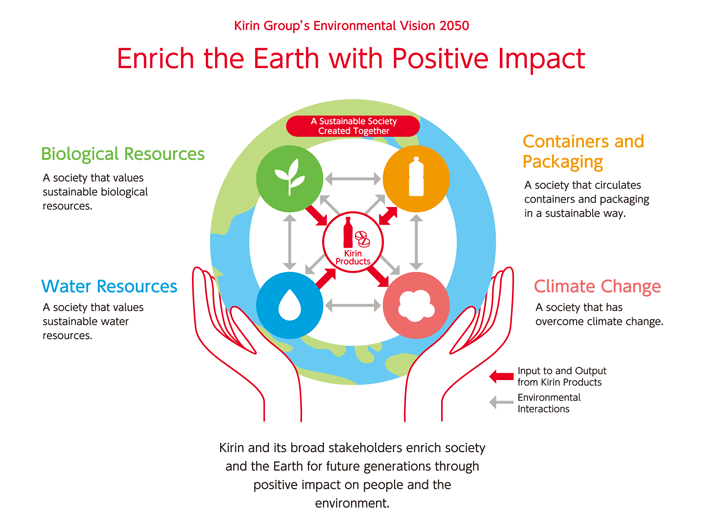
A Turning Point in Environmental Initiatives and the Formation of a Holistic Approach
We first presented our "holistic approach" to the world in the Kirin Group's Long-Term Environmental Vision, our long-term strategy for 2050, formulated in 2013. However, the prototype of this approach began to be formed as far back as the early 1990s.
In 1991, the year before the Earth Summit held in Rio de Janeiro, Brazil, we formulated the "Kirin Group Basic Policy for Addressing Global Environmental Issues." This was an opportunity for us to shift our focus from pollution control initiatives to activities with a global perspective, and in 1993 we revised our management philosophy under the policy of "aiming to be a corporate group that cares for the global environment." Since then, we have continued to promote activities with a global perspective, and our current four key issues of "water resources," "climate change," "containers and packaging," and "biological resources" are also based on the activities we have continued since the 1990s.
In 1993, the year after the Earth Summit, Kirin Brewery Tochigi and Hokuriku plants planted trees under the title "Creating Forests in Our Hometown." This initiative was succeeded in 1998 by the "Suigen no Mori (Water Source Forest) Activity" to nurture rich forests and conserve water resources at the same time, and continues to this day.
We have been actively involved in disclosing information related to the environment. We began publishing our environmental report in 1994. From a global perspective on the earth's environment, we started the publication of English version in 1996 and adopted a framework in accordance with GRI*5, the present standard of environment report, in 1999. Since the first edition of the GRI guidelines was published in 2000, we had adopted the GRI standards from the exposure draft stage of the previous year.
*5:Global Reporting Initiative, an international, independent standards advancement organization that helps businesses, governments, and other organizations understand and communicate their impacts on issues such as climate change, human rights, and corruption.
In 1997, when the Kyoto Conference on Climate Change (COP3) was held, Kirin Brewery Kobe Plant was completed as a model low-carbon, water-saving-advanced brewery. Kirin Brewery was recognized for its new environmentally friendly plant and proactive approach to information disclosure, leading to its presentation of environmental measures at the Kyoto Conference as one of Japan's representative companies.
Two years later, in 1999, we formulated the "Kirin Group Environmental Policy," declaring that we recognize global environmental conservation as one of our most important management issues and that we will promote the building of a sustainable society. While the Kyoto Protocol set the national GHG reduction target of -6% below 1990 levels by 2010, we had accelerated our efforts to combat climate change by setting a much higher target of -25% below 1990 levels.
Prior to this, in 1998, we revised its previous guidelines and formulated the "Guidelines for Designing Environmentally Friendly Containers and Packaging, etc.". And we also began working at the Group's Packaging Innovation Laboratory to reduce the weight of packaging containers. As a result, we reduced the weight of large beer returnable bottles from 605 grams per bottle to 457 grams, and by 2003, all large bottles produced by Kirin Brewery had been converted to lightweight bottles.
Then, following the 10th Conference of the Parties (COP10) to the Convention on Biological Diversity held in 2010 in Nagoya, we formulated the "Kirin Group Action Plan for Sustainable Use of Biological Resources" in 2013. In addition to full-fledged activities to conserve biodiversity, we also shifted our approach to water resources from mere water conservation to understanding water risk and water stress from a global perspective. We have also deepened our understanding of the impact of climate change on agricultural products and water resources, and we have come to recognize the need for a strategy that takes a "Holistic" perspective on environmental issues, with a good understanding of their interactions. This is how we formulated the "Kirin Group Long-Term Environmental Vision", which we announced in 2013.
The brewing philosophy of "Reverence for life" that cultivated the soil for a holistic perspective

What led us to realize the interconnectedness of the four environmental issues and to understand the importance of a "holistic approach" is the brewing philosophy of "Reverence for Life" that has been passed down through the generations at Kirin Brewery. Water, hops, and malt, the ingredients of the Group's ancestral beer business, are all gifts of nature. In the production process, the sugars in the wort are broken down into alcohol, and the aroma of the beer is determined by the yeast. This yeast is a microorganism, and is the very essence of "life" itself.
In order to brew beer, which not only depends on the bounty of nature in the form of agricultural products, but also on the work of microorganisms called yeast in the brewing process, we must respect life and humbly learn about the power of life. This is the concept of "Reverence for Life," which is based on the ideas of Dr. Albert Schweitzer, a German philosopher who was awarded the Nobel Peace Prize in 1952.
"I am life that wills to live in the midst of life that wills to live." -
Dr. Schweitzer's words suggest that we humans are part of life in the natural world, and that all plants, animals, and microorganisms are interrelated. Since everything is interrelated, there is no way forward if we only pursue our own growth. Dr. Schweitzer's words are also linked to the foundation of Kirin's CSV management, which is to work hand in hand with those around us to create value together.
And the reason we have been able to scientifically accumulate diverse environmental protection initiatives is also due to our "Reverence for Life," which advocates the importance of respecting and learning from nature. Learning about life is the pursuit of life science, and the pursuit of life science has fostered Kirin's organizational culture of emphasizing technology and R&D capabilities. Advanced environmentally friendly plant design and lightweight packaging containers are also products of science and technology, and would not have been possible without the culture to emphasize on science.
As for the "world's first" disclosure in the TNFD's LEAP framework mentioned at the beginning of this article, the reason we were able to take the lead from among the many companies in the world is that we have a track record of addressing environmental issues from a holistic approach to begin with. The TNFD was developed by expanding the scope of the TCFD*6, which specialized in climate change risk assessment, to include risk assessment for entire ecosystems, and this comprehensive perspective is consistent with Kirin's holistic approach. That is why Kirin was quick to disclose information in accordance with the TNFD.
*6:Task Force on Climate-related Financial Disclosure. A task force established by the Financial Stability Board (FSB) to examine how climate-related information should be disclosed and financial institutions should address the climate change.
Creating Positive Impact beyond the Company's own framework
The effects of climate change on agricultural products have already begun to emerge, and both the Paris Agreement adopted in 2015 and the final report of the TCFD published in 2017 conveyed the critical situation with a sense of urgency. Food companies that use nature's bounty as raw materials are the "canaries in the coal mine" of the global environment.
We have therefore substantially revised the " Long-term Environmental Vision " formulated in 2013, and announced the revised version "Kirin Group Environmental Vision 2050" in 2020. Now that the crisis surrounding the global environment has begun to emerge, it is not enough to simply minimize negative impacts and become neutral. Kirin, aiming to be a global leader in CSV, has set the goal of creating a positive impact that goes beyond its own boundary, while quickly achieving a neutral situation, so that society as a whole can decarbonize.
The most recent concrete example is the "30by30 Alliance for Biodiversity" led by the Ministry of the Environment in Japan, in response to the international "30by30" initiative, which aims to effectively conserve at least 30% of the ocean and land as healthy ecosystems, with the aim of halting and restoring biodiversity loss (nature positive). Kirin will participate in the "30by30 Alliance" as a target area for the late-stage demonstration project for nature symbiosis sites at the Mercian-operated vineyard, Mariko Vineyard. This is the first time in Japan that a farm that engages in agricultural production activities as a business, rather than simply forest conservation, etc., is subject to the Ministry of the Environment's trial certification.
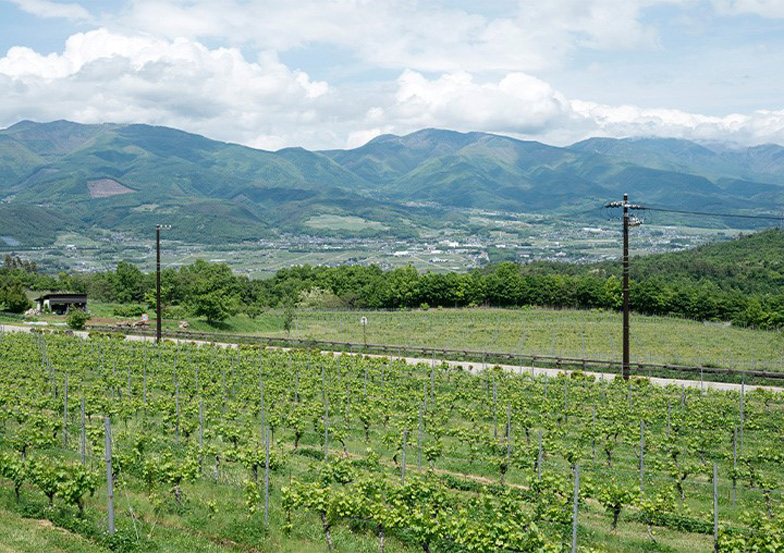
In our efforts related to renewable energy, we have emphasized the concept of additionality in increasing our renewable energy mix, and in addition to installing large-scale solar power generation facilities at all nine Kirin Brewery factories, we announced our participation in a consortium led by Mitsubishi Corporation Offshore Wind Power Company, which will start offshore wind power generation projects off the coast of Akita Prefecture and Chiba Prefecture. We will cooperate with them in terms of regional development and contribute to the expansion of renewable energy and the development of communities.
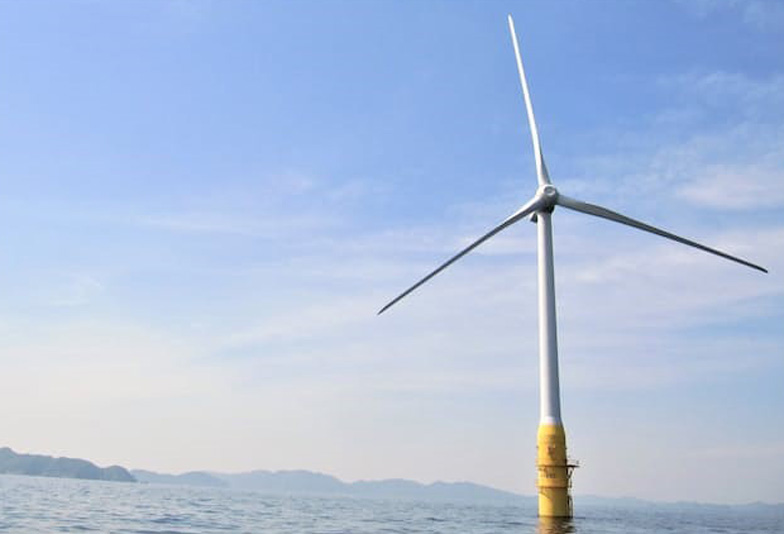
We are also collaborating with another company in the fight against plastic-related issues. We have initiated a joint project with Mitsubishi Chemical Corporation to establish a circular economy for PET through chemical recycling. While mechanical recycling, which accounts for most of today's recycled PET, has a limited number of recycling cycles due to quality deterioration, chemical recycling allows PET to continue to be used permanently as a resource. We aim to build a society in which plastics are recycled by establishing a system from collection to recycling not only used PET bottles but also various PET products.
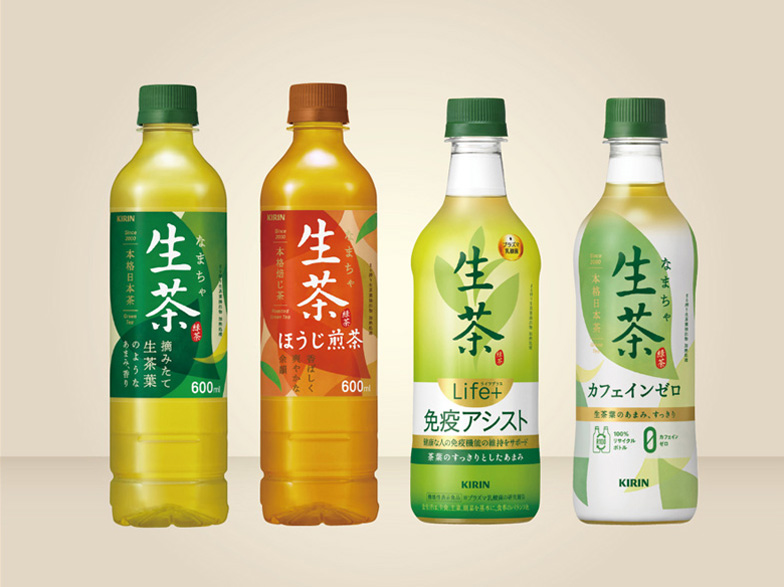
100% recycled PET bottles by mechanical recycling using recycled PET resin. PET bottles are reborn as PET bottles, reducing the amount of petroleum-derived resin used in their manufacture by 90%.
Developing our inherited DNA to become a global leader in CSV from the environment
Global environmental issues are difficult to solve by the efforts of a single company alone. Kirin's "holistic approach" is to go beyond its own framework and work hand in hand with other companies to solve environmental problems. We will leverage this unique "holistic approach" as a strength to achieve our goal of becoming a global leader in CSV.
According to Ryosuke Mizouchi, Senior Executive Officer, the answer is as follows.
Kirin's advanced environmental management and holistic approach are made possible by the Group's philosophy of "Reverence for Life" in the beer business, which is the Group's ancestral business, and by the technological and R&D capabilities that have been fostered by this philosophy. Former Chairman Chozo Isono, who led Kirin Brewery for a long time during and after the war, always called out to his employees in a more respectful manner when speaking to people at breweries than to people at the head office and the branch offices. This episode tells us that we are a company that places great value on monozukuri (the art of production, or craftsmanship), and that our generous investment in equipment and research and development to make better products has led to the development of energy-efficient facilities and environmental technology. We at Kirin will continue to inherit and develop our DNA as a production company of craftsmanship and make great strides as a global leader in CSV and a global leader in the environment.
Ryosuke Mizouchi
Mr. Mizouchi has been with Kirin group companies since 1982, mainly in marketing insight, international business, and corporate planning departments, and is currently a Senior Executive Officer of Kirin Holdings Company, Limited, overseeing the Creating Shared Value (CSV) function of the whole group.
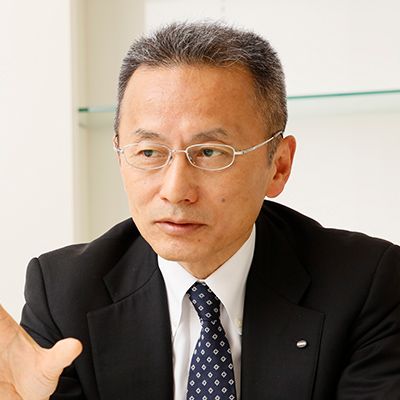
*Stated information as at the date it is made